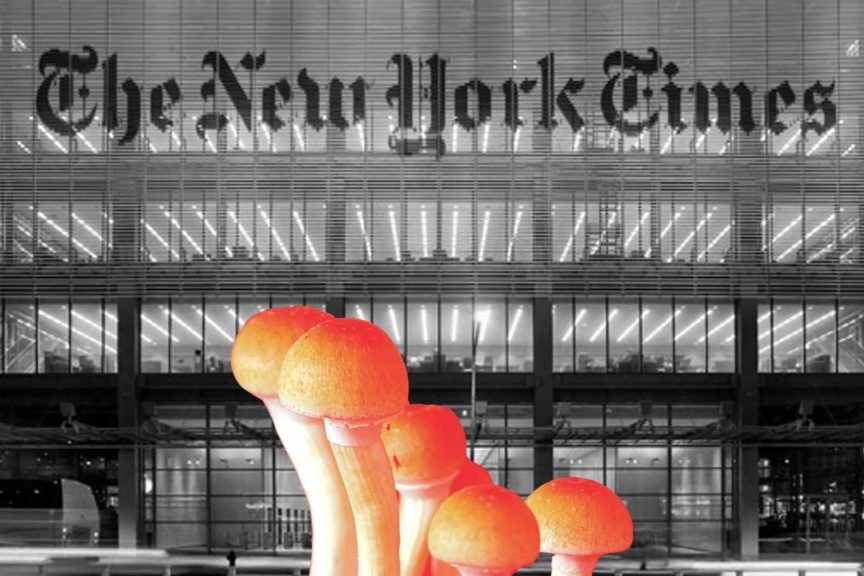The latest piece on psychedelic science in the New York Times is dead wrong
First, the entire premise—that Schedule I status is the primary obstacle to research—is flat-out wrong.

Psymposia is a 501(c)(3) nonprofit research and media organization that offers critical perspectives on drugs, politics, and culture. We rely on contributions from our readers and listeners. Your support is vital to sustaining Psymposia.
Support Psymposia’s independent journalism on Patreon and help us drive the Mystery Machine! We’re a bunch of meddling kids who are unmasking the latest shenanigans on the psychedelics beat.
There’s a new article in The New York Times, entitled Can Psychedelics Be Therapy? Allow Research to Find Out.
While I’m a strong supporter of psychedelic research, and have donated a large portion of all proceeds from my show The Mushroom Cure to the cause, this article is just dead wrong on every significant point.
First, the entire premise—that Schedule I status is the primary obstacle to research—is flat-out wrong. I know because I also once assumed this. Then, in writing my own opinion piece for Huffington Post, I corresponded extensively with the folks at the Multidisciplinary Association for Psychedelics Studies (MAPS), who clarified that schedule status is no longer a significant barrier—the FDA is now approving all legitimate psychedelic research.
The obstacle now is simply getting funding for research. That the author so completely misses the fundamental issue at hand demonstrates a lack of both basic understanding and even the most cursory research.
Second, the article states psychedelics “are illegal in the United States because they carry a high risk of abuse.”
Two huge inaccuracies in this one statement.
First, there is virtually no risk of abuse, at least not in the classic sense of daily use, physical dependency, selling worldly possessions to get a fix, associated spikes in crime, etc. (As anyone who’s done psychedelics too frequently will attest, these drugs will tell you pretty unambiguously if you’re pushing it too far too fast.)
Second, their alleged abuse potential has nothing to do with why they’re illegal. A full historical accounting is beyond my scope here, but suffice to say the prime motivating force behind the state and federal bans of 1969/70 was criminalizing a social movement that opposed Vietnam and the status quo in general. It was about power and politics, not public health (which some courageous politicians, most notably Senator Bobby Kennedy, recognized and tried to counteract).
Third, this: “They can also cause harm. The best-known adverse event is persistent flashbacks, though these are believed to be rare. More common are symptoms like increased heart rate and blood pressure, anxiety and panic.”
“Flashbacks” (really, the author means HPPD; flashbacks are defined as transitory, while HPPD is long term) are unheard of in any sort of responsible use context, while the other “harms” cited are all transitory—that is, they last only while one is experiencing the acute drug effects (and rarely last the entire duration of the experience). Twenty minutes of elevated heart rate or anxiety may be unpleasant, but they hardly qualify as harmful in any meaningful sense.
Finally, this piece massively understates the incredibly positive results obtained in recent research. With PTSD, addiction, end-of-life anxiety and other conditions, we’re routinely seeing massive effect sizes that dwarf anything seen—ever—for any other class of psychiatric medication. And the scientific studies establishing this are generally tracking results for anywhere from six months to several years after the administration of the drug, while pharmaceutical studies rarely collect data for more than a couple of months.
This makes the author’s statement that psychedelics have “no proven upsides” absurd; the upsides have been established more conclusively than for the pharmaceuticals that approximately 80 million Americans regularly take. (Granted, recent psychedelic research studies have been both few in number and small in size. There’s no question more research is needed, but there’s also no question as to the results that have thus far been obtained.)
In sum, this piece almost feels like anti-drug propaganda dressed in pro-legalization garb. I don’t actually think there’s anything nefarious afoot, but it’s breathtaking that the Times would publish such an inaccurate, ill-informed piece.
In perpetuating baseless myths under the guise of objective science, this article does far more harm than good. And let’s not lose sight of the stakes here: while the pendulum does indeed seem to be swinging towards renewed openness to psychedelic medicine, the momentum could easily reverse, especially in light of the current US Attorney General’s vehement opposition to medical cannabis. Of course, psychedelic research must continue to adhere to highest scientific and ethical standards, but understating the unprecedented efficacy and overstating the risks does a grave disservice to a rapidly flowering but still fragile branch of medicine.
Hey! Before you go… Psymposia is a 501(c)(3) non-profit media organization that offers critical perspectives on drugs, politics, and culture. We strive to ask challenging questions, and we’re committed to independent reporting, critical analysis, and holding those who wield power accountable.
Our perspectives are informed by critical analysis of the systemic crises of capitalism that have directly contributed to the unmitigated growth of addiction, depression, suicide, and the unraveling of our social relations. The same economic elite and powerful corporate interests who have profited from causing these problems are now proposing “solutions”—solutions which both line their pockets and mask the necessity of structural change.
In order for us to keep unpacking these issues and informing our audience, we need your continuing support. You can sustain Psymposia by becoming a supporter for as little as $2 a month.





